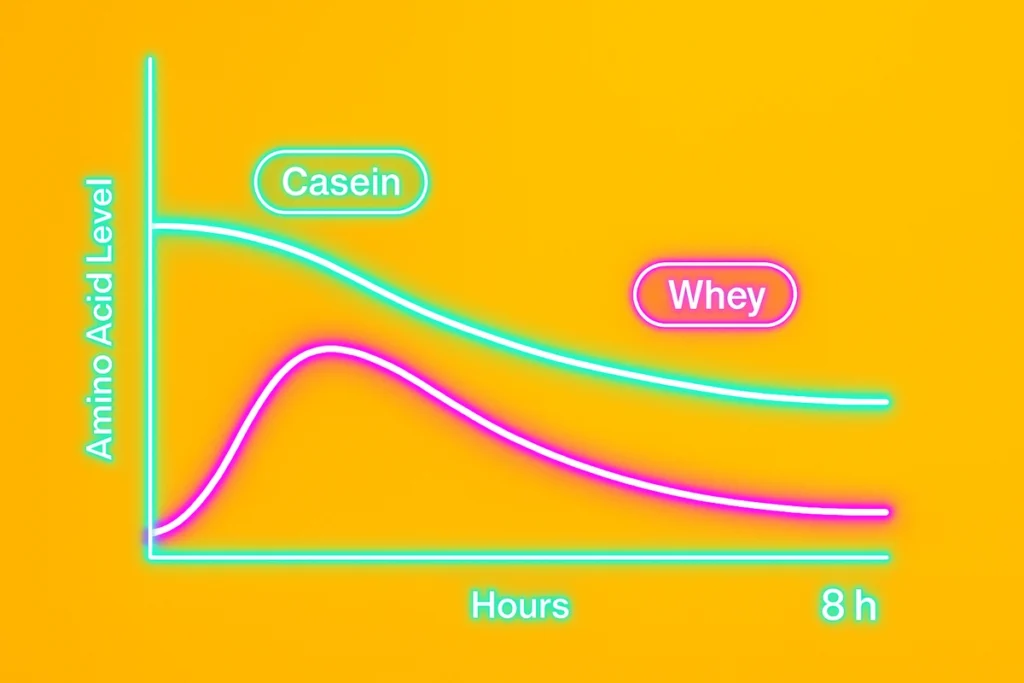Wondering how long casein protein lasts in your body—and what that means for muscle growth and recovery?
As a fitness coach who’s been through both bulking and cutting phases, I’ve used casein protein personally and recommended it to many clients.
Let me walk you through how long it works in your body, how to get the most out of it, and when it’s worth using.
Table of contents
How Long Does Casein Stay in Your Body?

Let’s get to the point: casein protein stays active in your system for about 6 to 8 hours.
That slow digestion is exactly why many athletes take it before bed.
It releases amino acids steadily over several hours, helping your body recover and rebuild muscle while you sleep.
Compared to whey, which spikes amino acid levels fast and then drops off, casein works like a slow drip—perfect for overnight repair or long fasting windows.
Learn more in this guide on the benefits of casein before bed.
I’ve personally used casein before bed during cutting phases, and I wake up feeling more recovered, especially after tough leg days. It’s subtle but powerful.
How Casein Protein Works Inside the Body

Here’s the science: casein forms a gel-like clot in the stomach, which slows its absorption.
That’s why it digests much slower than whey. This gradual breakdown releases amino acids slowly into your bloodstream, fueling muscle recovery over hours.
See how casein compares to whey for muscle growth.
For lifters who go long stretches without eating—like during sleep or work shifts—this makes casein incredibly valuable.
It keeps you in a muscle-preserving state longer, unlike fast proteins that spike and drop quickly.
Muscle-Building Benefits of Long Digestion

The slow-release nature of casein isn’t just a cool feature—it has direct benefits for muscle growth.
- Prevents muscle breakdown (catabolism) overnight
- Supports lean muscle maintenance during cutting or fasting
- Helps you stay anabolic longer, especially if your meals are spread out
- Improves satiety and reduces late-night cravings
One of my clients, David—a busy lawyer—used to wake up starving. After adding casein before bed, his hunger vanished, and he maintained more muscle during his cut.
You can find a full list of the best casein proteins for athletes here.
When to Take Casein for Best Results

In my experience, these are the most effective times to take casein:
- 30–60 minutes before bed (most common use)
- Before long work shifts if you can’t eat regularly
- After a large meal if you’re using it more as a meal replacement or snack
For best results, mix it with water or unsweetened almond milk.
If you’re like me and enjoy a bit of flavor and texture, add a spoon of peanut butter or a few almonds.
That makes it digest even slower—and taste like dessert.
Want more strategies? Check out this casein protein recovery guide.
How Long Does Casein Stay Effective in Your System?

While digestion takes 6–8 hours, the anabolic (muscle-building) effects can linger even longer—sometimes up to 10 hours.
That’s why it’s especially useful before sleep or during periods where food is unavailable.
See the best products for overnight recovery here.
During Ramadan, I rely on casein post-Iftar to ensure my body stays fed throughout the night and into my fast. It’s been a key tool for maintaining muscle.
Real-World Tips from a Trainer

I often recommend casein to:
- Clients on cutting plans or lower-calorie diets
- Night-shift workers who go hours without meals
- Intermittent fasting clients needing slow-release fuel
For example, Lina, a 26-year-old nurse working overnight shifts, kept losing muscle despite training hard.
We added a scoop of casein at the start of her shift, and it helped her control cravings, feel stronger, and stop the weight loss from affecting her muscle mass.
Also, remember that casein isn’t your only slow-release option.
Compare it to other protein sources like EAAs here.
Final Thoughts: Who Needs Casein the Most?

Casein isn’t for everyone—but it’s a powerful tool if used properly.
✅ Use it if you:
- Train at night
- Sleep long hours without eating
- Are cutting or fasting
- Need to reduce muscle soreness
- Want steady protein intake without frequent meals
Avoid it if you’re looking for a fast protein for pre- or post-workout. That’s where whey shines.
One client, Mark, was taking casein in the morning before workouts and felt heavy and sluggish. We swapped it with whey, and his performance instantly improved.
Quick Recap
- Casein lasts 6–8 hours in your system
- Best taken before bed or long fasts
- Ideal for muscle retention, hunger control, and recovery
- Works great when combined with whey in your overall protein strategy



Leave a Reply